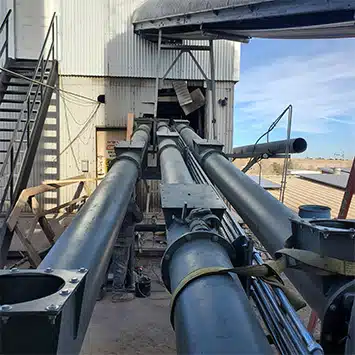Metering Dextrose from Super-Sacks Georgia Pacific Building Products in Fletcher, OK
General Description
Georgia Pacific in Fletcher, OK is a gypsum board mill and part of Georgia Pacific Building Products. Gypsum rock is mined at a nearby quarry and then crushed and ground into a fine powder. The powder is heated to approximately 350-degrees F during the calcining process to drive off three-fourths of the chemically combined water. The calcined gypsum, also called plaster or stucco becomes the base for gypsum plaster, gypsum board and other gypsum products. The calcined gypsum is then mixed with water and additives to form a slurry called calcium sulfate which is fed between continuous layers of paper on a board machine. As the board moves down a conveyor line, the calcium sulfate recrystallizes or rehydrates, reverting to its original rock state. The paper becomes chemically and mechanically bonded to the core. The board is then cut to length and conveyed through dryers to remove any free moisture.
Proper control of drying conditions is required to obtain uniform drying of the finished gypsum board across the full width and length from edge to edge. The edges of the gypsum board dry more rapidly than the main body or central portion of the board. Core temperatures close to the edges of the board often increase while the central portion of the board still contains free water. In order for the gypsum board to dry evenly and at a controlled rate, an organic calcination inhibitor is added to the calcium sulfate slurry. Calcination inhibitors employ a water-soluble organic compound such as a sugar or dimethyl urea. The sugars typically used are: dextrose or corn sugar. Dextrose is used at the Georgia Pacific Fletcher plant and is shipped in “Super-Sacks.” An inclined screw feeder meters the dextrose at a controlled rate into the slurry.
KWS replaced an existing screw feeder that was not properly sized for the application. The existing screw feeder could not accurately meter the dextrose and had many mechanical failures. The new KWS screw feeder solved all the problems and has been operating without issue since installation.
Design Parameters
- Product Type: Dextrose (Powdered Sugar)
- Material Density: 50 to 60 Lbs. per Cubic Foot
- System Capacity: 30 Cubic Feet per Hour
- Moisture Content: less than 20-Percent
- Duty: 24 Hours per Day, 7 Days per Week
KWS Advantages
A team from KWS visited the facility and met the Georgia Pacific Plant Engineer to determine the exact needs of the plant. While onsite, the KWS team gathered dimensional information on the existing equipment to determine solutions and recommend an inclined screw feeder which would resolve the issues.
Special Features
KWS replaced the existing screw feeder with a 6-inch diameter variable pitch screw feeder. The variable pitch design provides a controlled feed of dextrose to the slurry. The flights of the screw were continuously welded on both sides of the center pipe for extra strength and durability. The inclined screw feeder utilized a split tubular housing to contain the free-flowing dextrose and provide the most efficient design. A purgeable shaft seal was used on the tail end to prevent leakage of dextrose. KWS selected an integral-motor Dodge Quantis drive due to space constraints and to provide lower energy consumption.
Testimonial
"The new KWS screw feeder is working well. No issues with motor tripping or lumps not breaking up. We have additional conveyors that we will be requesting KWS assistance in redesigning next year."
Terry Whisenhunt, Reliability Leader – Georgia Pacific, Fletcher, OK

Existing Screw Feeder was Very Inefficient and Messy

New KWS Screw Feeder Eliminated All Previous Problems






